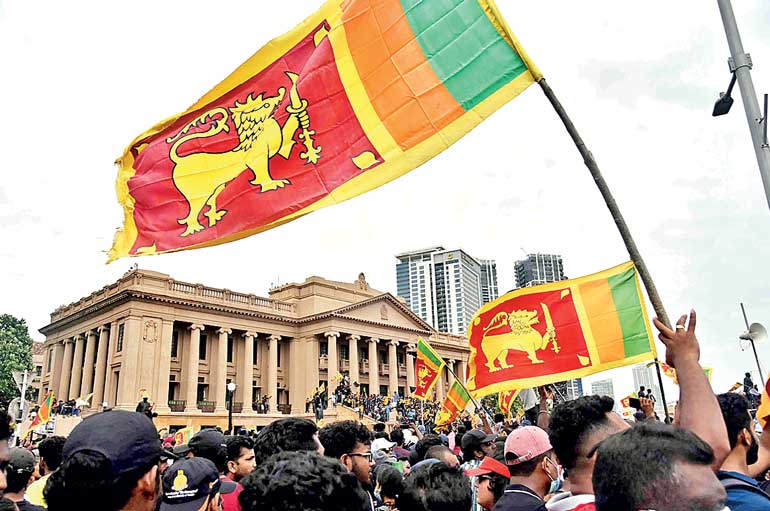Sunday Feb 22, 2026
Sunday Feb 22, 2026
Tuesday, 19 July 2022 00:00 - - {{hitsCtrl.values.hits}}

By Ahilan Kadirgamar and Devaka Gunawardena
The people’s uprising has finally ousted the Rajapaksa regime in Sri Lanka. The tremendous show of people’s power calling for the resignation of President Gotabaya Rajapaksa and Prime Minister Ranil Wickremesinghe provides lessons on democracy to the world at large.
What comes after such incredible political mobilisations? Will the dust settle in the weeks and months ahead, or does the awesome awakening of political consciousness guide politics into the years and decades ahead? The intersection of the political upheaval and economic crisis is likely to transform the state and society in Sri Lanka. As we grapple with these historic questions, what are the immediate possibilities for progressive forms of political and economic stabilisation?
The recent manoeuvrings of the political elite inside and outside of Parliament provide little confidence of a credible political transition being forged through the parliamentary process. Indeed, it is the collapse in the legitimacy of Parliament and the repeated failures of the parliamentarians to deliver on the democratic demands of the citizenry that led to the masses taking charge of the country’s political future. Therefore, much will depend on the continuous vigilance and engagement of the people’s movement.
In the lead up to the protests of 9 July 2022, there were several key demands that coalesced into those of the diverse movement: the immediate resignation of the President and Prime Minister; abolition of the executive presidency; formation of an interim government from the opposition to bring about political stability; a people’s council consisting of the people’s movements, trade unions, professional organisations, and other associations to hold Parliament accountable to the people’s demands; urgent economic relief to working people suffocating with price hikes and shortages; and holding elections after an interim period of six months to one year to elect credible representatives.
Amid this formidable political moment, the opportunistic jockeying for power continues in order to elect a new president from within Parliament, along with the formation of a new government with a new Prime Minister. Therefore, the people’s movement needs to provide a clear and focused direction to Parliament over the interim period.
This vision involves several components. First, the executive presidency must be curtailed and abolished. Different actors and groupings may try to moderate and water down this demand by stopping at restoring checks and balances through constitutional amendments. But these efforts must be seen as only prolonging the executive presidency. The hopeful background is that the social power accumulated through the people’s protest movement has set clear limits on the exercise of executive power.
Any new president elected from Parliament as per the current constitution should not execute any of those powers. And in the weeks ahead, considerable pressure needs to be applied on parliamentarians to abolish the executive presidency. Therefore, with an interim government, particularly if the courts assert that abolition requires a referendum, the President should only act as a symbolic figure until a referendum is held alongside the next parliamentary elections.
Second, is the issue of checking its plans and policies, given the Parliament’s current regressive limitations. It must be supplemented by other methods of institutionalising the concerns and demands of the people’s movement. Suggestions have included establishing a people’s council. In this regard, the central demand of progressive forces must be to widen representation to include not only the representatives of the youth movement and professional bodies concentrated in Colombo but also a diverse cross-section of society, including plantation labour, garment workers, farmers, fisherfolk, and informal livelihood earners, among other groups. While the focus of the media was on Galle Face and its surroundings, the reality is that the movement to oust Gotabaya Rajapaksa would not have been successful if the regime had not already lost the hinterland.
Third, there must be an economic policy reset. The underlying cause for this historic uprising has been the devastating impact of the economic crisis. People were left to fend for themselves during the pandemic-led lockdowns. They were offered little relief while the situation has continued to deteriorate. In fact, the last four months have been gruelling as the central bank, the finance ministry, and, more recently, Prime Minister Wickremesinghe have implemented the recommendations of the International Monetary Fund (IMF) in order to seal an elusive agreement.
Those austerity measures have led to the collapse of the economy, resulting in enormous increases in the cost of living, falling income streams, and disrupted livelihoods. Sri Lanka’s gross domestic product could contract by a tenth as the economic depression is further aggravated by austerity policies meant to provide confidence to the IMF and international creditors. The priority for the interim government must shift the focus to economic relief and stimulus to prevent the economy from collapsing totally. Any far-reaching economic reforms should only be pursued after a fresh mandate in the next elections.
These amazing days of democratic mobilisation in Sri Lanka have shown that the era of neo-liberal policies, implemented most recently by an authoritarian populist regime and merely oriented towards powerful international actors, will not be accepted by the people. The great democratic strivings of the people may confront major obstacles in the upcoming weeks and months. But the people’s resilience as seen from the waves of protests over the last many months points to the possibility of major changes in Sri Lanka’s political economy in the years and decades ahead.
(Source: https://www.epw.in/journal/2022/29/comment/peoples-uprising-and-challenges-transition-sri.html)